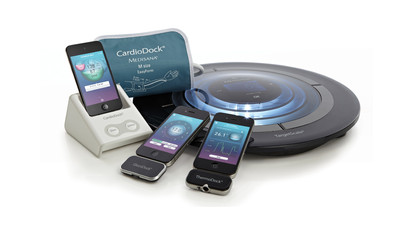How to keep fit with your iOS device
Healthy, happy and fit with your iPhone, iPod Touch or iPad
There's a whole slew of iOS accessories that can help track biometric data too. You might, for example, be advised to watch your blood pressure, and for many of us, getting a blood pressure test from a doctor is infrequent, inconvenient and stressful - which, ironically, pushes up your blood pressure.
Instead, a blood pressure cuff from Withings or Medisana lets you measure yours regularly, and in the comfort of your own home. The results are stored and plotted on a graph on the bright colour screen of your iPhone, iPad or iPod touch, so it's easy to see trends and problems, and consult with your doctor to interpret results and formulate strategies to improve your health.
Both companies make other medical hardware that connect to iOS devices too. Withings' original product was a set of Wi-Fi scales which not only measure your weight but also your lean and fat mass - and, as an encore, your Body Mass Index. Results are sent to the web, and can be viewed on your iOS device.
Medisana makes a similar set of scales. We found them a bit inconsistent when we tested them a few months ago, but Medisana was working on the problem. The Fitbit Aria scales are at least more consistent.
Brand loyalty

When picking one of these sets of scales, allow yourself to be influenced by whether you own something else from the same company. If you already have the Medisana blood sugar monitor to help control diabetes, for example, and want to buy a set of scales that will send its measurements to your device, you should consider the VitaDock TargetScale from the same company.
We say this because having all your biometric data feeding into one app or one platform makes it easier to spot trends and correlate events; you can see, for example, what effect weight loss over a period of time has on the frequency and dose of insulin injections. Medisana even makes an infrared thermometer that plugs into your device's dock connector, and while infrared thermometers can only measure surface rather than core body temperature, something like this would still be a great way of tracking, say, a fever.
There is, then, a huge ecosystem of kit that you can add to your iPhone, iPad or iPod touch in the quest to improve your general well-being, but you don't even need to spend lots of money on hardware. There are, of course, many dozens of great apps that are ready to gently guide or challenge you, and some of them don't cost a penny.
Get daily insight, inspiration and deals in your inbox
Sign up for breaking news, reviews, opinion, top tech deals, and more.
Apple has created a great list of these apps on the App Store, which you can browse through here - tap on that link to be taken straight to the list on the App Store.
Let's talk about a few of the apps that Apple has highlighted, ones that we think are particularly worthy of your attention, as well as a few other ideas. Which apps you get will depend on what kind of exercise you want to do - and if you don't want to do exercise, at least just yet, you'll have to skip a few paragraphs to get to the apps that aren't about exercise!
If running's your thing, you can choose between the stalwart RunKeeper or the Nike Plus Running app (discussed in the section on Nike) when you want to track and map your runs. Nike's app is a little prettier to our eyes, and hooks into the wider Nike ecosystem, but serious runners tend to prefer RunKeeper.
As we've mentioned, one of RunKeeper's really cool features is the ability to broadcast your run live on a map great for letting friends, family and fans see how you're doing on a half marathon, for example.